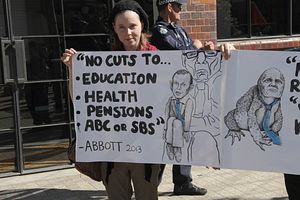The Australian Broadcasting Corporation may cull up to 400 jobs after cuts of some A$254 million ($217 million) were announced some days ago. A quarter of senior journalists will lose their jobs. Television station the Special Broadcasting Service (SBS) will also face cuts.
“Aunty,” as the ABC is affectionately known. is facing one of her most serious problems yet. The national broadcaster is set not just to lose its reporters, directors, and administrators, but many of its programs, its overseas bureaus, and its rural programs. The entire South Australian operations center will be shut down. This prompted an inexplicable petition from South Australian native Education Minister Christopher Pyne to “save” it. Pyne has not been noted in his time in office for his dislike of funding cuts. State versions of current affairs programs such as the 7.30 Report, shown every Friday, will also end.
Australian Prime Minister Tony Abbott is on record saying that the broadcaster would not face cuts, which ended up being announced by Communications Minister Malcolm Turnbull. Still, Abbott’s apparent dislike of the broadcaster was rather well known. Early this year, he said of the ABC, “A lot of people feel at the moment that the ABC instinctively takes everyone’s side but Australia’s. I think it is a problem.” He was speaking about its revelations of Australian spying in Indonesia, notably on the then-president and his wife (although under a Labor government). Around the same time in January, an “efficiency review” of the ABC and SBS were announced, though Turnbull went on record to say there was no correlation between the two and it was “completely coincidental.” He added, “There is no assault on the ABC. There is no more passionate defender of the ABC than me… I believe the ABC is a vitally important part of our nation’s polity; it is one of the great foundations of journalism and news gathering and broadcasting in the country.”
Only months ago the formerly ABC-run Australia Network (a cable channel broadcasting Australian content to Asia) was shut down, which, as we reported at the time lost Australia an important plank in its soft power in the region and many expats a chance to catch football games at the pub.
There are worries, expressed by 7.30NSW presenter Quentin Dempster, that the broadcaster, under a Charter to provide well-researched, fair and balanced coverage, may switch from journalism to “churnalism,” going after the clicks that sites such as the Australian version of Buzzfeed are now getting. Dempster has previously called the cuts “Abbott/Murdoch bastardry.” That Murdoch’s papers strongly supported Abbott’s candidacy during the election is well known.
The Sydney Morning Herald has quoted unnamed journalists as saying that those in the newsroom faced Survivor-like conditions. “Journalists were given a sheet of paper with a list of skills benchmarks and told if they were unable to meet them they would face losing their jobs before Christmas. The new benchmarks focused on the ability to report stories across multiple platforms, including mobile and online.”
But the real losers may be rural communities and provincial townspeople, who relied on the network not just to deliver “flagship” broadcasting but to report stories from their own communities and keep people in Australia’s vast hinterlands informed. Long-running programs such as Bush Telegraph will be axed.
Although Abbott and his supporters in the media have long conflated the ABC with what they see as out-of-touch intellectual elites and leftists, the network remains one of the country’s most trusted entities. An Essential Media poll conducted around the time of the January “efficiency review” found it Australia’s second-most trusted institution, after the Supreme Court. Eighty-five percent of people polled believed it provided a useful service.

































